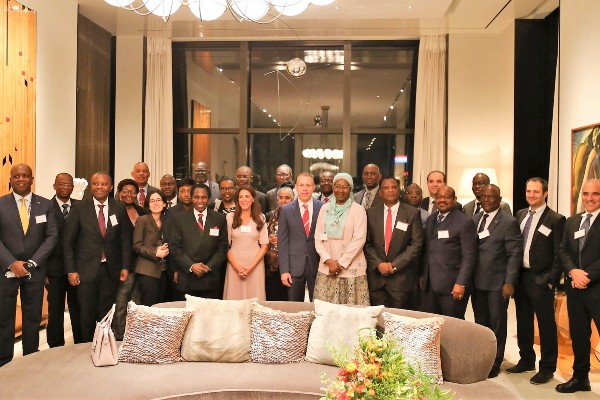“The strategic alliance between Israel and Africa has the power to stimulate innovation that can change our environment.”
By Aryeh Savir, TPS
Israel’s Ambassador to the United Nations (UN) Gilad Erdan hosted 25 ambassadors from African countries and unveiled a new Israeli initiative to connect some 2,000 villages in Africa to running water and renewable energy.
On Monday evening, as part of a program to strengthen Israel’s relations with African countries and to maintain its status as an Observer in the African Union, Erdan held the event in collaboration with Innovation: Africa and its founder Sivan Ya’ari.
Martin Kimani, Kenya’s Ambassador to the UN, which currently serves as a member of the Security Council, and Harold Adlai Agyeman, Ambassador of Ghana, which was recently elected to the Security Council, were both present.
Erdan and Ya’ari detailed the groundbreaking activities, which are being planned and executed together with MASHAV, Israel’s Agency for International Development and Cooperation, and other leading Israeli organizations
Erdan declared that “the same spirit and creative energy that made Israel a start-up nation are what makes Africa the continent of the future.”
“Israel is constantly investing in expanding our relationships and creating new ties with Chad, Morocco, and Sudan and opening new embassies and trade offices. Israelis and Africans are working together on countless projects. Through MASHAV, we are establishing agricultural centers, building medical centers, empowering farmers, and preserving the environment,” he said.
“We are only at the beginning of our journey. The strategic alliance between Israel and Africa has the power to stimulate innovation that can change our environment,” he added.
After almost 20 years, Israel rejoined the African Union in July, a significant diplomatic achievement.
However, Erdan noted that “there are those who still oppose the strengthening of our relationship and even seek to undo Israel’s new status as an observer state in the African Union. This discrimination against Israel, which has a land border with Africa, enjoys relations with 46 African countries and is engaged in development and extensive economic activity, is hypocritical, biased and impairs the progress of our region.”
Ya’ari of Innovation: Africa said that the event “highlighted the importance of energy in improving the lives of people in Africa. Through Israeli solar, water and agricultural technologies, Innovation: Africa has already improved the lives of over three million people and through the partnerships established tonight, we will continue, together, to help millions more.”
Israel’s improving ties with African countries is mostly the product of former Prime Minister Benjamin Netanyahu’s “Israel is returning to Africa” policy and his historic visit to East Africa in July 2016, during which he visited Uganda, Kenya, Rwanda and Ethiopia.
Weeks later, the Republic of Guinea, a Muslim-majority African nation, restored diplomatic ties with Israel after a 49-year break.
In the following August, Senegal and Guinea, two Muslim-majority West African nations, sent their first-ever ambassadors to Israel.





